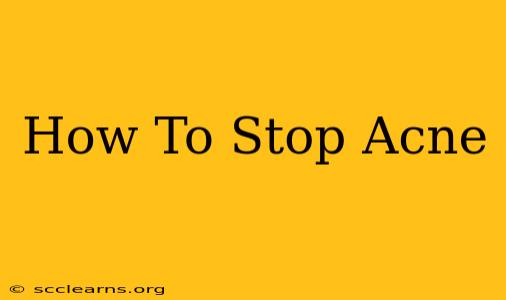Acne. That unwelcome guest that seems to pop up at the worst possible times. Whether you're dealing with a few blemishes or a full-blown breakout, the frustration is real. But don't despair! This comprehensive guide will equip you with the knowledge and strategies to effectively manage and even stop acne, leading you towards clearer, healthier skin.
Understanding the Root Causes of Acne
Before diving into solutions, it's crucial to understand what causes acne. It's not just about poor hygiene, although that plays a role. Acne is a complex skin condition primarily stemming from:
- Excess Sebum Production: Your skin's oil glands produce sebum, a natural oil that keeps skin moisturized. Overproduction leads to clogged pores.
- Clogged Pores: Excess sebum, dead skin cells, and bacteria combine to block pores, creating a breeding ground for acne-causing bacteria.
- Inflammation: The body's inflammatory response to clogged pores contributes to redness, swelling, and pain associated with acne.
- Hormonal Fluctuations: Hormonal changes, especially during puberty, menstruation, and pregnancy, significantly impact sebum production, often triggering acne breakouts.
- Genetics: A family history of acne increases your likelihood of developing the condition.
Effective Strategies to Stop Acne
While there's no magic bullet, a multi-pronged approach is key to effectively managing and stopping acne. Here's a breakdown of effective strategies:
1. Develop a Consistent Skincare Routine
A simple, yet effective routine is essential. This should include:
- Gentle Cleansing: Wash your face twice daily with a gentle, non-comedogenic cleanser (meaning it won't clog pores). Avoid harsh scrubbing.
- Exfoliation: Regular exfoliation (1-2 times a week) helps remove dead skin cells, preventing clogged pores. Choose a gentle exfoliant containing salicylic acid or glycolic acid.
- Moisturizing: Even oily skin needs hydration. Opt for a lightweight, oil-free moisturizer.
- Spot Treatments: For individual pimples, consider spot treatments containing benzoyl peroxide or salicylic acid.
2. Dietary Considerations
While diet's role in acne isn't fully understood, some foods may exacerbate breakouts. Consider:
- Reducing Dairy Intake: Some studies suggest a link between dairy consumption and acne.
- Limiting Processed Foods and Sugar: These can contribute to inflammation.
- Increasing Antioxidant-Rich Foods: Fruits and vegetables packed with antioxidants may help combat inflammation.
3. Lifestyle Adjustments
Lifestyle factors can also play a significant role:
- Manage Stress: Stress can worsen acne. Practice stress-reducing techniques like yoga, meditation, or deep breathing exercises.
- Get Enough Sleep: Adequate sleep allows your skin to repair itself.
- Avoid Touching Your Face: Touching your face transfers bacteria and oils, potentially worsening breakouts.
4. Over-the-Counter Treatments
Numerous over-the-counter acne treatments are available:
- Benzoyl Peroxide: Kills acne-causing bacteria.
- Salicylic Acid: Helps unclog pores.
- Sulfur: Reduces inflammation and oil production.
5. When to See a Dermatologist
If over-the-counter treatments aren't effective, or if you have severe acne, consult a dermatologist. They can prescribe stronger medications like retinoids, antibiotics, or hormonal therapies tailored to your specific needs.
Maintaining Clear Skin: Long-Term Strategies
Once you've achieved clearer skin, maintaining it requires ongoing effort. Continue with your effective skincare routine, maintain a healthy lifestyle, and monitor for any changes that might trigger new breakouts. Remember, consistency is key to long-term success in managing acne.
Keywords: how to stop acne, acne treatment, clear skin, acne remedies, stop acne breakouts, acne prevention, best acne treatment, get rid of acne, home remedies for acne, skincare routine for acne, over the counter acne treatment, dermatologist for acne, benzoyl peroxide, salicylic acid, hormonal acne, inflammatory acne, cystic acne.

